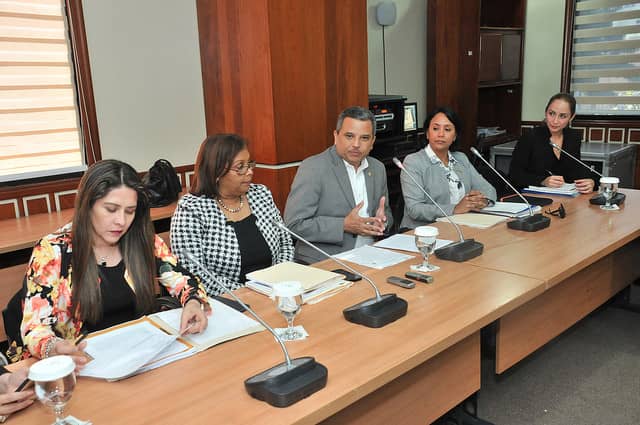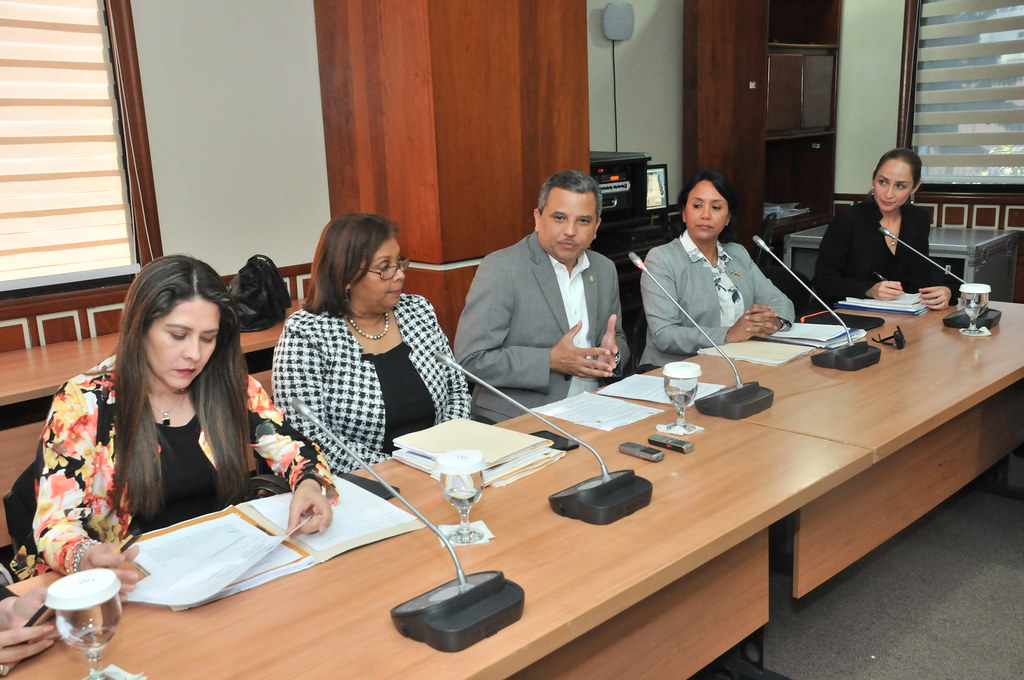
Three years after the successful Parliamentary Seminar entitled “Protecting Human Rights, Combating Discrimination and Addressing HIV/AIDS of Persons with Diverse Sexual Orientations and Gender Identities” was hosted by the Chamber of Deputies of Dominican Republic, in Santo Domingo on October 10-11, 2013, PGA organized a field mission to follow up on the Santo Domingo Plan of Action adopted at this Seminar, which included a clause for the country calling for cooperation among parliamentarians, relevant national officials, LGBTI activists, people living with HIV/AIDS, and UN agencies to work towards implementing actions on equality and non-discrimination.
Background
In December 2013, the Dominican Republic’s National Council on HIV and AIDS (known as CONAVIHSIDA) coordinated the formation of a multi-sectorial working group to draft a project of General Law on Equality and Non-Discrimination (project of General Law) in response to the outcome documents from PGA’s Seminar and the Global Commission on HIV and the Law.
This working group, the National Group for the Elimination of All Forms of Stigma and Discrimination (known as GRUNEED), drafted a project of General Law that benefited from the consultation and participatory process of all members of GRUNEED, such as government entities, civil society organizations, international development organizations and PGA, as well as representatives from key stakeholders and affected populations, including the LGBTI community, sex workers, drug users, deportees, people with special needs, seniors, migrants, women, children, and adolescents.
In August 2016, once the national consultation process was exhausted and the feedback from all key stakeholders was incorporated, the project of General Law was submitted to Mr. Danilo Medina, President of the Dominican Republic. The Executive Legal Counsel’s office is currently reviewing the project of General Law and is expected that, in line with President Medina’s National Strategy for Development 2030, which recognizes equality as a pillar for public policy, the project would be introduced in the National Congress for its discussion and eventual approval as law within the next year.
Therefore, PGA’s mission on November 9-11, 2016, led by Ms. Desirée de Sousa-Croes, MP from Aruba, Dip. Jenny Álvarez from Chile and Vice-Chair of PGA’s National Group in the country, and Mónica Adame, Director of PGA’s Gender, Equality and Population Program, sought to raise visibility of and disseminate the project of General Law among legislators to assist in building political support for its review and discussion in Congress. Additionally, PGA shared copies of a working version of the publication Advancing the Human Rights and Inclusion of LGBTI People: A Handbook for Parliamentarians (Handbook for Parliamentarians), prepared in collaboration with UNDP, and translated into Spanish for this mission. These advocacy efforts are implemented in close coordination with PGA’s National Group in Dominican Republic and CONAVIHSIDA.
PGA’s delegation held a working meeting with CONAVIHSIDA, preceded by a press conference to present the project of General Law to the public at-large, and meetings with legislators’ members of the Committees on Human Rights and Gender Equality at the Chamber of Deputies as well as with UN agencies in the country.
Main items discussed & key results
- The meeting convened by Dr. Víctor Terrero, CONAVIHSIDA’s Executive Director, brought together representatives from the Executive Legal Counsel’s office, the Human Rights Unit of the Attorney General, and the Defensoría del Pueblo, as well as LGBTI activists and Dominican legislators. During the meeting, the agency’s legal staff presented the main items of the project of General Law, its object, purpose and scope, as well as the main categories of discrimination the project intends to prevent and prosecute.
The project of General Law seeks to protect against discrimination based on “skin color, national or ethnic origin, age, sex, sexual orientation, gender identity and expression, language, religion and/or spiritual beliefs, cultural identity, political or any other type of opinions, social origin, socio-economic position, education level, migration condition or being a refugee, deportee, stateless person or internally displaced person, disability, people who have had fulfilled their sentences, genetic characteristics, mental or physical health condition, including infectious-contagious, psychic-incapacitating or any other, imprisonment, among others.” - Senator Julio César Valentín, Chair of PGA’s National Group in Dominican Republic, Dip. Magda Rodríguez Vice-Chair of the Group and Chair of the Gender Equality Committee, and Dip. Fidel Santana, Secretary of the Group and Chair of the Human Rights Committee, joined PGA delegates in the meeting with CONAVIHSIDA and highlighted the importance of legislating to protect and guarantee the rights of all individuals in accordance to article 39 of the Dominican Republic’s Constitution. Senator Valentín noted that the Republican system of government calls for enacting laws and public policy in accordance to the needs and challenges of the citizenry and not to individuals’ ideas or religious beliefs. He expressed his willingness to advocate with his peer legislators on this topic and to continue working against discrimination. Mrs. Minou Tavárez Mirabal, a former legislator and former PGA’s President, also attended the meeting with CONAVIHSIDA, and reminded participants that the legislative reform was a pending task to fulfill the country’s human rights international obligations.
- Ms. De Sousa-Croes and Dip. Álvarez shared the context of Aruba and Chile, respectively on legislative gains to guarantee equality and non-discrimination. Ms. De Sousa-Croes recalled her own experience as a lesbian parliamentarian and the obstacles she has had to overcome to introduce initiatives in favor of equality in the Aruban Parliament, such as the recent civil unions’ bill. Dip. Álvarez highlighted the case of Chilean citizen Daniel Zamudio, who was tortured and murdered for being gay, and whose horrible death prompted Congress to adopt anti-discrimination legislation in 2012. She urged legislators to enact protective measures and not to wait until something, as cruel and inhumane as what happened to Daniel Zamudio, happens to someone else in Dominican Republic.
- Dr. Terrero expressed his gratitude to PGA for its support to the project of General Law and for the organization’s assistance on parliamentary sensitization and advocacy for equality and non-discrimination for all key populations in the country. He reminded the media and participants that this legislative initiative is part of the Executive’s development plans, and in line with regional and international obligations, and is intended to guarantee and protect the equal access of all and each person in the country to human rights, healthcare, education, employment, justice, freedom of expression, religion and culture, among other rights. In addition, the Law also contemplates prosecuting and sanctioning discriminatory practices and behavior having a potential deterrent effect.
- The meeting with legislators’ members of the Human Rights and Gender Equality Committees respectively, was attended by 15 members, of which six of them had attended PGA’s first Seminar on SOGI hosted by their Chamber in 2013. There was a common agreement on the need for more sensitization and education about sexual orientation and gender identity. Dip. Santana, Chair of the Human Rights Committee, noted that equality is a pillar in the construction of citizenry and that legislators should not allow themselves to fall in a false confrontation between the State and the church. Ms. De Sousa-Croes’ candid testimony about the discrimination she and her wife have faced contributed to build empathy from some legislators who expressed inaccurate statements about gay people. She emphasized that this is an issue that needs to be addressed by parliamentarians and that the isolation of LGBTI people, caused by society’s stigma and discrimination, is what provokes their ‘perceived exhibitionism.’ “There is no need to rebel if a society accepts a person as she or he is,” said Ms. Sousa-Croes. At the end of the meeting, a couple of female legislators approached her to learn more about her story.
- In total, thirty-five copies of the Handbook for Parliamentarians were distributed among Dominican legislators, CONAVIHSIDA staff, and LGBTI activists.
Next Steps
- Follow up with Dip. Santana as Chair of the Human Rights Committee and Secretary of PGA’s National Group, about organizing a possible event on equality and non-discrimination to celebrate Human Rights Day on December 10 in the Chamber of Deputies.
- In coordination with CONAVIHSIDA, contact the Executive Legal Counsel to learn more about the current review and inquire the timeframe for the project of General Law’s introduction in Congress.
- In collaboration with PGA’s National Group in Dominican Republic, continue sensitization and advocacy actions using the Handbook for Parliamentarians and explore a possible second field mission to coincide with the formal introduction of the project of General Law in Congress.
PGA is grateful to the Global Equality Fund (GEF), administered by the State Department of the United States, for its support to the realization of this activity.
For more information, please contact:
Ms. Mónica Adame
GEP Program Director
E: monica.adame@pgaction.org
T: +1-646-762-7295


